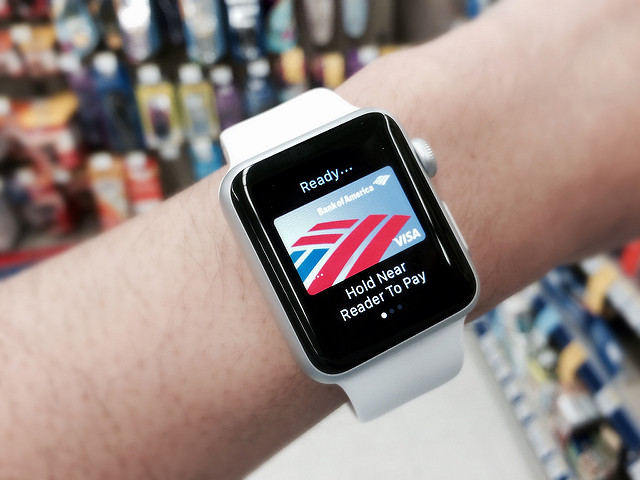
“APPLE WATCH – APPLE PAY” (CC BY-ND 2.0) by shinya
The increasing popularity of digital payments means that we are edging closer and closer towards a cashless society. In 2015, Denmark made the move towards getting rid of the legal obligation for shops to accept cash payments in an attempt to cut down on costs for processing cash. The move made sense as an estimated third of the country’s citizens already used an official state mobile app called MobilePay to make payments. With the rise of alternative forms of payment such as contactless cards, mobile apps, and Bitcoin, it’s looking ever more likely that the concept of physical cash will become obsolete in our lifetimes.
Apple Pay was announced in 2014 and since then has spread to 13 different countries across the globe. The service allows users to link their bank accounts to their mobile devices, using the same terminals as contactless cards so that the service can capitalise on the existing infrastructure. In July 2016, Apple’s Tim Cook estimated that Apple Pay accounted for 75% of all contactless payments made in the United States. The app’s widespread use is proof of the fact that customers are more than happy to take advantage of the convenience of being able to make payments with a simple touch of the phone rather than having to rifle through wallets or count coins, and the fact that the service is provided by the biggest smartphone company in the world means that it is destined to spread to even more countries soon enough.
In a more niche market, the introduction of the pay by phone casino has allowed people to make bets using nothing more than their phone bill. Before the first digital casino was opened during the dot-com bubble of the mid-1990s, the only way to place a wager would be to go to a brick-and-mortar betting shop or casino and use cash. The internet certainly changed all that. Today, people can make bets without even linking their bank account to the site – the money simply comes out of the customer’s phone bill at the end of the month.

“Bitcoin” (CC BY-SA 2.0) by zcopley
Bitcoins are another important development in digital currency. The value of the Bitcoin has grown steeply since it was introduced in 2009, giving rise to incredible stories about small investments growing into fortunes in a few years. The easiest way to use Bitcoins is using a digital Bitcoin “wallet”, which resides on your phone or you can access on the web. Bitcoins are accepted by an astounding 100,000 merchants worldwide and have gone from being a somewhat quirky experiment to a serious economic force, which is why it’s not surprising that major banks including CBS and Santander have been planning to develop their own form of digital currency based on Bitcoin’s blockchain technology. The major advantage of Bitcoin over traditional digital currency is that Bitcoin is capable of making completely anonymous transfers, which provides users with a level of security that exceeds regular currencies. The blockchain technology also means that the currency is not at all centralised making it harder for corruption to take place.
Gone are the days when digital payments were seen as little more than a security risk. With the exponential developments in technology over the last decade or so have come increasingly secure and convenient ways of transferring money that are beginning to make physical currencies seem a little old-fashioned.